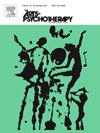角色转换增强了对他人的理解,而不是对自我的理解
IF 1.5
3区 心理学
Q3 PSYCHOLOGY, CLINICAL
引用次数: 0
摘要
心理戏剧等心理治疗方法的关键技术之一是角色转换,在这种方法中,来访者参与描绘另一个人的戏剧性行为。人们认为,这样的描绘不仅能让人了解自己,还能让人了解被描绘者的观点和经历。在这项实验研究中,大学生(n = 57)被要求讲述一个涉及另一个人的冲突事件。在不同的情况下,他们从自己的第一人称视角(“我”),从第三人称视角(“她/他/他们”),或者从“虚构的第一人称”视角(以“我”的身份说话,同时描绘另一个人),后者类似于心理剧中的角色转换。每次试验后对自我报告问卷进行的受试者内部分析显示,相对于第一人称情况,角色转换并没有增加对自己行为的洞察力,但却显著增加了对他人行为的洞察力,以及与那个人的联系感。这些结果表明,角色转换可以增加对与我们有冲突的人的同理心。本文章由计算机程序翻译,如有差异,请以英文原文为准。
Role reversal enhances an understanding of the other, but not of the self
One of the key techniques of psychotherapeutic methods like psychodrama is role reversal, in which a client engages in the dramatic act of portraying another person. Such a portrayal is believed to provide insight not only into oneself, but into the perspective and experiences of the portrayed person. In this experimental study, university students (n = 57) were asked to recount a conflictual episode involving another person. In different conditions, they did so from either their own first-person perspective (“I”), from the third-person perspective (“she/he/they”), or from the “fictional first-person” perspective (speaking as “I” while portraying the other person), where the latter is akin to role reversal in psychodrama. A within-subject analysis of self-report questionnaires following each trial revealed that, relative to the first-person condition, role reversal failed to increase insight into one’s own behavior, but led to a significant increase in insight into the other person’s actions, as well as a sense of connectedness with that person. These results suggest that role reversal can increase empathy for someone with whom we are in conflict.
求助全文
通过发布文献求助,成功后即可免费获取论文全文。
去求助
来源期刊

Arts in Psychotherapy
Multiple-
CiteScore
3.20
自引率
11.10%
发文量
66
期刊介绍:
The Arts in Psychotherapy is a dynamic, contemporary journal publishing evidence-based research, expert opinion, theoretical positions, and case material on a wide range of topics intersecting the fields of mental health and creative arts therapies. It is an international peer-reviewed journal publishing 5 issues annually. Papers are welcomed from researchers and practitioners in the fields of art, dance/movement, drama, music, and poetry psychotherapy, as well as expressive and creative arts therapy, neuroscience, psychiatry, education, allied health, and psychology that aim to engage high level theoretical concepts with the rigor of professional practice. The journal welcomes contributions that present new and emergent knowledge about the role of the arts in healthcare, and engage a critical discourse relevant to an international readership that can inform the development of new services and the refinement of existing policies and practices. There is no restriction on research methods and review papers are welcome. From time to time the journal publishes special issues on topics warranting a distinctive focus relevant to the stated goals and scope of the publication.
 求助内容:
求助内容: 应助结果提醒方式:
应助结果提醒方式:


